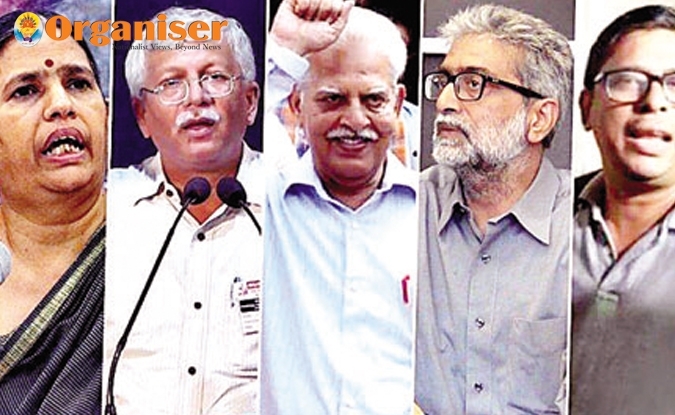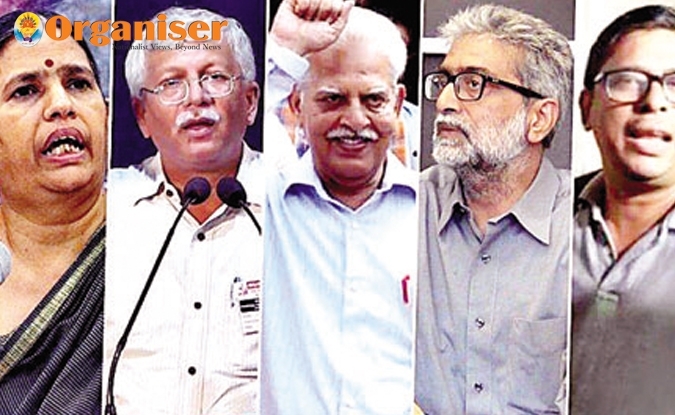Vara Vara Rao ArrestedEverything about Urban Naxal Ecosystem
| Date: 19-Nov-2018 |
Vara Vara Rao Arrested
Everything about Urban Naxal Ecosystem
Untangled Urban Naxals
Coutsey:- Organiser Weekly)


By:- Ramanand & Sumit Gupta
There is a skinny line between orchestration of dissent and the veiled motive of carrying out violence. State at no cost should allow Urban Naxals to go scot-free under the undue pressure of speech and expression
We have been listening for a week that democracy is in danger and Emergency has come now. But we still see hundreds of opinion pieces, rallies, the demonstration against the current Union Government. It shows that the basic foundation of democracy is so strong in our country and you can not affect it by merely calling it fascist.
It has begun with the arrest of some people who have allegedly involved in Naxal/Maoist activity. We need not to tell you what Maoism is and how it severely affects our country. A simple google search will show you how dangerous this philosophy is and how many lives it has taken since its formation.
The Pune police lately detained four Maoist sympathisers, viz., Varavara Rao, Vernon Gonsalves, Sudha Bharadwaj and Arun Ferreira. Meanwhile, Gautam Navlakha has been put under house arrest after Delhi High Court stayed his detention.
We have heard for ages that prevention is better than cure although, in health issues, yet its application is equally desirable and necessary in political affairs. These people were arrested under several provisions of UAPA,1967 and sedition provisions of IPC like section 153A,117 etc.
To jump to conclusions that the state is against the dissent and therefore these people have been arrested doesn't hold ground. Let's probe deeper and find how Naxalites set up works. The Naxalism had its origin from Naxalbari village of West Bengal in 1967 under the leadership of Charu Majumadar, Kanu Sanyal and Jangal Santhal. The so-called protectors and self-acclaimed messiahs of Poor, downtrodden and marginalised have today become the most significant internal security challenge to the state. The words of Dr Manmohan Singh in 2006 are quite relevant in this regard. He declared Naxalism to be the greatest threat to the fabric of democracy and without a doubt it is.
To understand how Naxalism works, let's look into its structure. Naxalism has at its top a core committee aka central committee. Under it, two more sub-committees work, these are— Politburo and Central Military Commission. The Politburo acts as a think-tank of core committee and performs works such as contacting with like-minded
political parties, politicians, academicians and so-called intellectuals and sympathisers. These people work to make the nefarious activities of Naxalites look alike as dissent or as an attempt to show their disaffection. In fact what they tend to do is that they tend to give legitimacy to the illegitimate act of Naxals. The arrest of these people has been done on the basis of similar nexus they shared with Politburo, i.e. think tank of core committee.
The next committee of Naxals is Central Military Committee (CMC). This committee decides the way in which attacks on police personnel and state institutions have to be carried out. They, in addition, form the job of recruitment, arranging fund as well as carrying out the extortion plan. However, their role will be highly curtailed if they fail to get logistical and legal support from Politburo which comprises ofso-called intellectuals like lawyers, activists and human right protectors.
1. The goal of Naxalism is to overthrow the democratically elected Government of India violently and to establish their autocratic totalitarian regime by hoisting the red flag of Maoism
2. The so-called protectors and self-acclaimed messiahs of poor, downtrodden and marginalised have today become the most significant internal security challenge to the country
The very goal of Naxalism is to overthrow the democratically elected Government of India violently and to establish their autocratic totalitarian regime by hoisting the red flag of Maoism. The very intriguing question they fail to answer is Why cannot they choose the democratic method to put forth their grievances than adopting the violent, murderous way.
These five people were arrested after Police established and found the concrete proof against them although yet to be certified by the court of law. Their role in enticement of Bhima-Koregaon violence on January 2 cannot be outrightly denied. They were directly or indirectly involved in enticing the violence as police have found the link between these people and those active in violence. Associates of various arrested have already been charged under multiple acts like UAPA and provision of IPC.
While it cannot be denied that Freedom of speech and expression is the central vein of democracy under article 19(1)(a) of the constitution of India which itself is the fundamental right and hence cannot be curtailed on the trivial ground. One can also not deny the fact that every freedom comes with some form of legitimate restrictions. And in case of freedom of speech and expression, it is reasonably restricted on various grounds including security and integrity of India is one of them, mentioned under article 19(2) of the constitution.
The state in order to secure the security and integrity of this multilingual Composite cultural nation has to take actions against those who seek to destabilise the foundational fabric of our democracy. Let's imagine a situation where the state didn't arrest these people and let them go free. If the allegations turn out to be true and they succeeded in carrying out attacks and destabilise the nation, those who are criticising this move of arrest will again come out as the most significant critic saying state failed to provide the necessary security to its citizens.
Therefore, we have to realise that there is a skinny line between orchestration of dissent and the veiled motive of carrying out violence. State at no cost should allow these to go scot-free under the undue pressure of speech and expression. We need to check the activity of state and have right to criticise it on every step. We should not hesitate to question the motives of state at any time. But we should also remember that the country belongs to all. We can democratically change the system by the electoral process. Because you think you can not convince people electorally and democratically, you pick another mode of change which involves violence and other things.
Naxalism/Maoism and other kinds of terror activities are mainly the tools of those people who do not believe in the basic principle of our Constitution. They think that their freedom of expression, their rights are carrying more weightage than those of others and that isquite opposite to the underlying philosophy of democracy.
Let the law take its course. And let Justice prevail!
(Ramanand is a Research Scholar, CIE, University of Delhi & Sumit Gupta is a Research Scholar at NUJS, Kolkata)